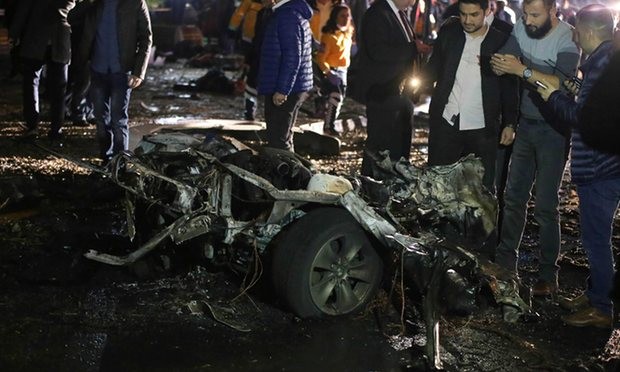Turkey: Above 30 killed and more wounded in Ankara fatal explosion

At least 34 people have died after a car bomb exploded in the Turkish capital Ankara, less than a month after a suicide car bomber killed dozens of military personnel and civilians in the city.
The Turkish health minister confirmed the number of fatalities and said at least 125 people were being treated in hospitals, with 19 in a serious condition. The governor’s office also confirmed that the explosion was caused by a car bomb.
According to local broadcaster TRT, a car exploded near a transport hub in an area that also houses many administrative buildings, including the justice and interior ministries, a court and a police station. A large number of fire engines and ambulances have rushed to the scene. There were reports of burnt-out busses and damage to several buildings. TRT said the area was crowded when the bomb went off at 6.43pm (1643 GMT), only blocks from the scene of a similar attack in February.
A reporter from another local news agency, Haber Turk, described a gruesome scene. “The explosion occurred on Atatürk Boulevard at a place where there are 10 bus stations. It is assumed that it was a suicide bomber. There is a vehicle that is mostly destroyed. It is impossible to give any numbers of those who were wounded. But there are many wounded people and burning cars.”
Reuters reported that several rounds of gunfire could be heard immediately after the explosion in the Kizilay area, but that has not been confirmed.
Turkish police, fearing another bomb attack, cordoned off the area and turned away journalists rushing to the scene. Pictures posted on social media immediately after the incident appeared to show a bus almost completely destroyed. Turkey’s broadcasting agency, RTÜK, has since issued a broadcast ban.
Business and trade groups condemned the attack. “The struggle of our government against terrorist organisations has come to such a point that those groups are barely able to survive,” said Ibrahim Çağlar, head of the Istanbul Chamber of Commerce (ITO). “Such attacks that are done solely with the aim to spill blood just show the sorry state these terrorist organisations are in. They will only achieve that the Turkish state and the Turkish people will stand even stronger together.”
The pro-Kurdish Democratic Peoples’ party (HDP) also denounced the attack. “We condemn the bomb attack that occurred this evening in Ankara,” a statement read. “We underline that none of these painful events will manage to destroy the brotherly feelings of our people.”
There were no immediate claims of responsibility for the attack. Turkish media
reported that the interior minister, Efkan Ala, talked to the Turkish president, Recep Tayyip Erdoğan, via telephone to inform him about details of the blast. The prime minister, Ahmet Davutoğlu, met leading security officials.
Later, a court in Ankara banned Twitter and Facebook after images from the scene of the blast were shared online.
Less than a month ago, a car bomb killed 29 people and wounded at least 60 others in Ankara. The militant Kurdistan Freedom Hawks (TAK) claimed responsibility for the attack and said on its website that the bombing came in retaliation for ongoing security operations in the predominantly Kurdish south-east, and that attacks would continue.
“From now on, the AKP [the ruling Justice and Development party] and its collaborators won’t be able to live in a fascist dictatorship so comfortably in their own city. As of now, we won’t be responsible for the safety of international airlines that fly to Turkey, or for foreign tourists,” the group wrote in a statement last month.
The claim contradicted the Turkish government who had blamed the People’s Protection Units (YPG), a Kurdish militia that has been supported by the US in the fight against Islamic State in northern Syria and that is closely linked to the outlawed Kurdistan Workers’ party (PKK), for the Ankara attack.
The February attack was carried out close to Turkey’s military headquarters, the parliament, and other key state institutions.
Turkey has suffered a string of bloody terrorist attacks in the past 19 months, most of which were blamed on Isis militants, who are said to be responsible for at least four bomb attacks on Turkish soil since June 2015. Last October, a twin suicide attack targeting a peace rally organised by Kurdish and leftist groups in Ankara killed 103 people and wounded 250 more in the deadliest terrorist attack in the country’s recent history.
On 11 March, the US embassy in Ankara issued a warned about a potential terrorist attack that might target Turkish government buildings.
How to submit an Op-Ed: Libyan Express accepts opinion articles on a wide range of topics. Submissions may be sent to oped@libyanexpress.com. Please include ‘Op-Ed’ in the subject line.
- Libya’s HCS invites applicants for key state roles - December 31, 2023
- UK calls on Iran to prevent escalation in Israel-Hamas conflict - November 05, 2023
- Libyan Interior Minister: Immigrant shelter costs a fortune - November 05, 2023


